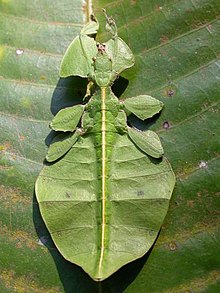The family Phylliidae (often misspelt 'Phyllidae') includes the living true leaf insects or walking leaves, which include some of the most remarkable leaf mimics in the entire animal kingdom. They occur from South Asia through Southeast Asia to Australia. There are different views about their taxonomy.[1]
| Leaf insects Temporal range: Eocene – Recent | |
|---|---|

| |
| Phyllium from the Western Ghats | |
| Scientific classification | |
| Kingdom: | |
| Phylum: | |
| Class: | |
| Order: | |
| Family: | Phylliidae Redtenbacher, 1906 |
Leaf insects use camouflage to take on the appearance of a leaf. They do this so accurately that predators often cannot distinguish them from real leaves. In some species the edge of the leaf insect's body even has the appearance of bite marks. To further confuse predators, when the leaf insect walks, it rocks back and forth, to mimic a real leaf being blown by the wind.[2]
They and stick insects go together in the Order Phasmatodea.
The scholar Antonio Pigafetta may have been the first to document the creature. Sailing with Ferdinand Magellan's circumnavigational expedition, he studied and chronicled the fauna on the island of Cimbonbon as the fleet hauled ashore for repairs.[3]
-
A leaf insect in the Children’s Museum of Indianapolis
-
Leaf insect in Pakke Tiger Reserve
- ↑ Bradley, J.C.; Galil, B.S. (1977). "The taxonomic arrangement of the Phasmatodea with keys to the subfamilies and tribes". Proceedings of the Entomological Society of Washington. 79 (2): 176–208.
- ↑ Cott, Hugh B. 1940. Adaptive colouration in animals. Methuen, London, p329.
- ↑ Bergreen, Laurence (2003). Over the Edge of the World: Magellan's terrifying circumnavigation of the globe. William Morrow. ISBN 0066211735.
 Article Images
Article Images